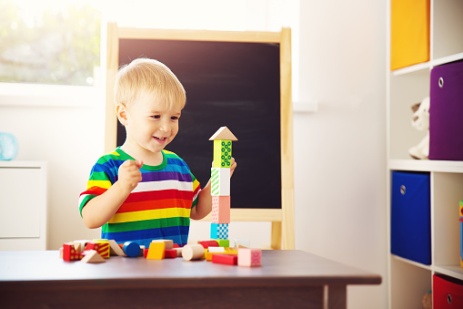“Wow! You are a great builder!” Ms. Tammy says as she looks at Josh’s complex block construction. No doubt Ms. Tammy means her words to be encouraging, and Josh probably enjoys hearing them. But research shows us that these words are not the most likely to lead Josh to develop persistence and a willingness to try challenging tasks. Ms. Tammy’s words can be termed people praise. That is, they focus on the type of person Josh is rather than his actions. In contrast, process praise focuses on a child’s actions and efforts. Using this type of praise, Ms. Tammy might say, “You worked on that building a long time, Josh. You balanced the blocks carefully so they didn’t fall. I think it’s the tallest one I have seen you build so far! Did it turn out the way you were hoping?” These words draw attention to Josh’s efforts and actions.

Researchers from the University of Chicago and Stanford University (Gunderson, et. al. 2013) observed and recorded parents interacting with their toddlers in a natural setting. Five years later, the children who usually received process praise had a more “can do” attitude than those who usually received people praise. When we focus praise on children’s hard work and persistence, we send a message that our efforts matter. Saying things like “You’re a good girl,” or “You’re good at math,” may communicate that our abilities are fixed and unchangeable.
The idea of using praise carefully is not new. Many articles have been published pointing out that the way we communicate with children is important. This long-term study provides even more evidence that using the right words can ultimately lead children to feel empowered to take on hard tasks. They will know their hard work and persistence can lead to success!
The chart below describes some common situations for young children and gives examples of ways we as adults might respond. The more often we say things that are similar to the words in the process praise column, the more likely we are to see children have a strong work ethic.
| Situation |
People Praise |
Process Praise |
| A child is painting at the easel |
That is just beautiful! You are such a good artist! |
You worked so hard on that picture! You used a lot of different colors. I can tell you put a lot of time and thought into it. |
| A child is tossing a ball back and forth with you |
Great arm! You are a natural-born pitcher! |
Wow! Your aim is getting better every day! That practice is really paying off. |
| A child is practicing writing letters. |
You are so smart! You know a lot of letters. |
Some of those letters are hard to write, but you did not give up. You kept trying and now you can write them. I’ll bet you will do an even better job tomorrow. |
| A child is organizing a group to act out a story |
You are such a good leader and so creative! |
Your group made a great plan and followed through. I notice that you listened to everyone’s ideas and worked together. When Joey couldn’t get the boxes after all, you didn’t give up. You figured out a new way to make the houses you need. |
| A child is dancing |
Dancing is really your thing! You have a natural rhythm. |
You must have practiced really hard to learn to dance so well. |
| A child explores different ways to use a toy |
That was really clever! |
You found so many different ways to use that toy! You kept trying new ways. Some of the ways you tried didn’t work, but you didn’t let that stop you. |
When we make a point to offer process praise, we help children develop strong approaches to learning that will prepare them for a lifetime of learning!
Reference:
Elizabeth A. Gunderson, Sarah J. Gripshover, Carissa Romero, Carol S. Dweck, Susan Goldin-Meadow, Susan C. Levine. Parent Praise to 1- to 3-Year-Olds Predicts Children’s Motivational Frameworks 5 Years Later. Child Development. 2013
Back to blog listing